Middlesbrough: Where heroin is cheaper than cigarettes
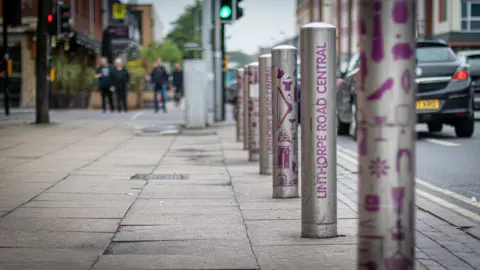 BBC
BBCIn Middlesbrough, a bag of heroin can cost as little as £5. It is not the only town in England to see problems with the drug and homelessness. BBC Tees reporter Adam Clarkson spent an evening on the streets with people who wanted to tell their stories.
"You want hardcore? I'll show you hardcore."
Longshank is 46 years old. That's not his real name but how he wants to be referred to. He's homeless and has promised to "show me the ropes". About five years ago, he found himself sleeping rough. He had struggled with alcohol addiction for years, but said it was the death of his wife that saw his life spiral out of control.
"She was my partner in crime, the best thing that ever happened to me. I was with her 31 years. It broke my heart," he said.
He's drinking a two-litre bottle of cider when we meet. He drinks at least one every day.
"I get wrecked just to get numb. I can't face the music," he adds, "But life has to go on."
He describes his life as "horrendous".
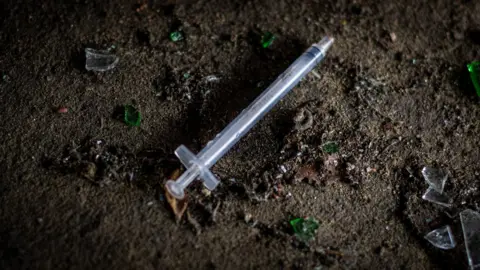
Two days ago, somebody threw a bucket of urine at him.
"It was in the middle of Linthorpe Road. I was just sat there. They swilled me. You wouldn't believe it. I've never been so humiliated."
We walk to the same spot when a drunk man, who is known to Longshank, becomes aggressive towards me. Things become heated, but calm down as the man bursts into tears. He says he and his partner recently lost a baby, and are facing the prospect of becoming homeless.
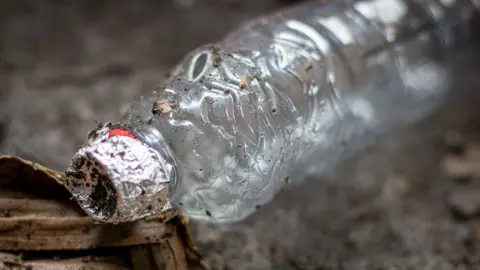
I am told that arguments and violence "come with the territory".
Longshank then shows me "the bedroom department" - a sheltered car park behind a restaurant, where many rough sleepers congregate. This is where I meet a 22-year-old who introduces himself as Little Man. Little Man says he has been using heroin since the age of 12.
"It's upsetting. I didn't have to go down this route. It breaks my heart, I could do more with my life. There's guaranteed to be a drug dealer within 100ft," Little Man says.
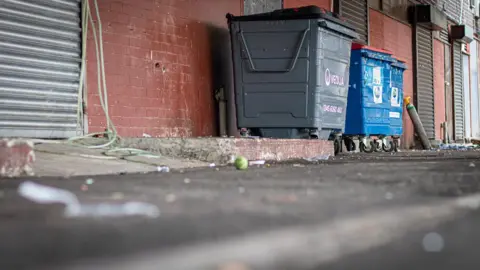
I watch as Little Man, Longshank and a number of others pass around a bag of heroin. The powder is melted, mixed with vinegar and put into a syringe.
One man injects himself in his groin.
Tom Le Ruez, Middlesbrough Council's drug-related deaths co-ordinator, says mixing vinegar is "not a particularly good idea".
"It isn't advised that people inject at all, but injecting in environments like dark alleys increases the risk that people will damage their veins."
A bag of heroin costs as little as £5, I am told. Little Man says it's very easy to find. A member of staff comes out of the back door of the restaurant. She tells me Longshank is "no bother", but other people are known to start fires and defecate behind their bins.
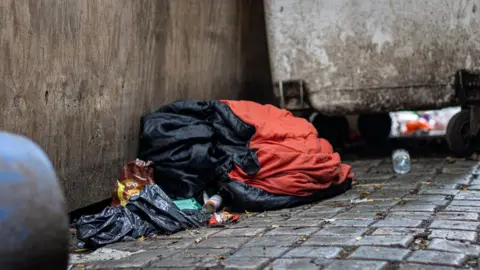
Three men arrive and ask if anybody wants to buy drugs. The atmosphere becomes tense when they realise I'm a journalist. Longshank says we need to leave, so we go back to Linthorpe Road. Longshank tells me he was given a flat by the local authority, but it was taken off him when he chose to sleep rough instead.
"I had appointments the next morning at the other side of town. I couldn't walk all that way to walk back again; there's no method in the madness."
I ask Longshank if he's using that as an excuse. He tells me it's possible he is.
"I'd miss all of these guys. It's not all doom and gloom, you know? We have a giggle. The streets are addictive, it is an addiction. It's worse than a drug."
In 2018, the North East saw the second biggest rise in rough sleepers, with a 29% increase. Despite this, the wider region has had the lowest number of rough sleepers in the country since the government began collecting data with an "annual single-night snapshot" in 2010. But Tracy Guy from Shelter said the true scale of homelessness in the North East is "largely hidden from view" as people are "trapped in temporary accommodation or sofa-surfing with friends and family".

More to Middlesbrough
 Getty Images
Getty Images
According to Middlesbrough Council, there are 11 rough sleepers in the town. That number has risen every year since 2016.
The town has seen drug-related mental health hospital admissions rise from 16 per 100,000 people in 2013-14 to 43 in 2016-17.
Debbie Cochrane, Middlesbrough Council's homeless lead, says help is offered to them every week.
"If they say no, that's fine," she says, "but it doesn't mean we're going to stop trying because one week they might say 'I don't want to live like this any more' and that's when they would be welcomed with open arms.
"That's their life and we're not here to judge. It's not up to us to say 'that's wrong'. If that's how they want to live then that's fine, but the opportunity is there to break away - if that's what they want to do."
Longshank and I part ways. I go home, and he continues the cycle of begging, buying drugs and using them.
"Every day, it's the same" he says. "It's like space invaders. It's a game."
